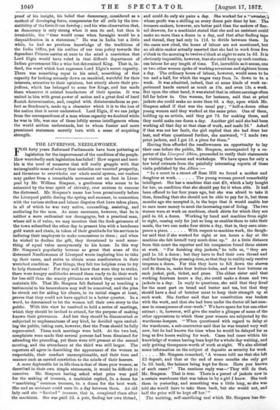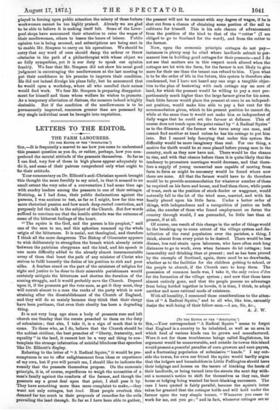THE LIVERPOOL NEEDLEWOMEN.
FOR forty years Reformed Parliaments have been pottering at legislation for the improvement of the condition of the people. How wretchedly such legislation has failed ! How urgent and terri- ble is the need of measures that will really grapple with that unimaginable mass of misery that underlies our vaunted prosperity, and threatens to overwhelm our whole social system, our readers may gather from a remarkable movement set on foot in Liver- pool by Mr. William Simpson, a gentleman who seems to be animated by the true spirit of chivalry, ever anxious to succour the distressed. Mr. Simpson's name has been prominently before the Liverpool public during the spring and summer, in connection with the various strikes and labour disputes that have taken place, in all of which he was very active, counselling, assisting, and mediating for the men. As some assurance, however, that he is neither a mere enthusiast nor demagogue, but a practical man, whose aid is of value, we may mention that the dock-gateamen of the town subscribed the other day to present him with a handsome gold watch and chain, in token of their gratitude for his services in inducing their employers to make concessions to them ; and when he wished to decline the gift, they threatened to send 'some- thing of equal value anonymously to his house. In this way Mr. Simpson's popularity became so great that some of the distressed Needlewomen of Liverpool wrote imploring him to take up their cause, and strive to obtain some amelioration in their wretched condition. Poor things, they felt too helpless even to try to help themselves! For they well knew that were they to strike, there were hungry multitudes around them ready to do their work for less still than the scanty pittance on which they contrived to maintain life. That Mr. Simpson felt flattered by so touching a testimonial to his benevolence may well be conceived, and the plan he struck out for aiding his clients, in its initial stages at least, proves that they could not have applied in a better quarter. In a word, he determined to let the women tell their own story to the public. With this view he resolved to hold a series of meetings, which they should be invited to attend, for the purpose of making known their grievances. And lest they should be disconcerted or subjected to unpleasantness of any kind, he decided upon exclud- ing the public, taking care, however, that the Press should be fully represented. Three such meetings were held. At the two last, complaints were made that several persons had been dismissed for attending the preceding, yet there were 400 present at the second meeting, and the attendance at the third was still larger. The reporters all agree in describing the appearance of the women as respectable, their conduct unexceptionable, and their tone and manner such as carried conviction to the minds of their hearers.
A more deplorable lot in life than is that of these poor women, as described in their own simple statements, it would be difficult to conceive. Mr. Simpson having asked what price was paid for the making of trousers, a machinist replied, 3s. a dozen for " machining " common trousers, 4s. a dozen for the best work. She and an assistant could earn 3s. a day between them. An old lady said she " finished " trousers, that is, completed them after the machinist. She was paid 2d. a pair, finding her own thread,
and could do only six pairs a day. She worked for a "sweater,'i whose profit was a shilling on every dozen pair done by her. The trousers-makers, however, are better paid than the makers of flan- nel drawers, for a machinist stated that she and an assistant could make no more than a dozen in a day, and that after finding tape and thread, they had only is. lid, to divide between them. In the cases now cited, the hours of labour are not mentioned, but an oil-skin-maker actually asserted that she had to work from five o'clock in the morning to twelve o'clock at night to earn is. 6d. It is obviously impossible, however, that she could keep up such continu- ous labour for any length of time. Yet, incredible as it seems, one or two other women spoke of working seventeen and eighteen hours a day. The ordinary hours of labour, however, would seem to be ten and a half, for which the wages vary from 7s. down to 4s. a week. It was admitted, indeed, that at some kinds of work ex- perienced hands earned as much as 10s. and even 12s. a week. But upon the other hand, it was stated that in others earnings often fell far below 4s. One woman, for instance, said that at print jackets she could make no more than 6d. a day, upon which Mr. Simpson asked if that was the usual pay ; " half-a-dozen other young women said they worked at the same price. One of them, holding up an article, said they got 7d. for making those, and they could make one dozen a day. Another girl said she had been working all that day at that class of work, and made 2d." Asked if that was not her fault, the girl replied that she had done her best, and when questioned further, she answered, "I made two print jackets, and I got Id. a piece for them."
Having thus afforded the needlewomen an opportunity to lay their case before the public, Mr. Simpson, accompanied by a re- porter of the Liverpool Albion, proceeded to verify their statements by visiting their homes and workshops. We have space for only a few brief extracts from the painfully interesting reports of these visits published by the Albion :— " In a court in a street off Rose Hill we found a mother and daughter at work The young woman proved remarkably intelligent. She has a machine that cost £8, which a lady bought for her, on condition that she should pay for it when able. It had been offered to her four years ago, but she was afraid to take it then, dreading that she should not be able to pay for it, but three months ago she accepted it, in the hope that it would enable her to earn more money to meet the increasing cost of living. The two women were at work on machines, check shirts for which they are paid 4s. 6d. a dozen. Working by hand and machine from eight to eight, ceasing only for just so long as enables them to take their meals, the two can make four shirts a day, that is, they earn nine- pence a piece With respect to machine work, the daugh- ter said that if she worked for eight or ten hours a day at the machine she felt herself very much done up." At a little distance from this court the reporter and his companion found three sisters at work. "For finishing slop jackets," he tells us, "they are paid is. id. a dozen ; but they have to find their own thread and coal for heating the pressing-iron, so that they in reality only receive tenpence a dozen. For this they have to fell down the sleeves and fit them in, make four button-holes, and sew four buttons on each jacket, pick, ticket, and press. The eldest sister said that working fourteen hours a day, she could make a dozen and two jackets in a day. In reply to questions, she said that they lived for the most part on bread and butter and tea, but that they should have a deal of butcher meat to keep their strength up at such work. She further said that her constitution was broken with the work, and that she had been under the doctor all last sum- mer in consequence of over-work." We have space for but one other extract ; it, however, will give the reader a glimpse of some of the other oppressions to which these poor women are subjected by the warehouse-keepers. "When questioned with regard to delay at the warehouse, a sub-contractor said that he was treated very well now, but he had known the time when he would be delayed for as long as five hours waiting for work. Cases had come within his knowledge of women having been kept for a whole day waiting, and only getting threepence-worth of work at night. We also elicited some information on the subject of deposits as security for work.
Mr. Simpson remarked, A woman told me that she left 1.2 deposit, and that at the end of some months she only got 7s. 6d. back, the balance being kept for fines. Have you known of such cases ? ' The cautious reply was—' They will do that, Mr. Simpson. That is true. There is a parcel of jackets now in a certain warehouse that was taken in by a girl I know. She took them in yesterday, and something was a little long, so she was told she would have to take them back, but she would not, and half the price will be kept off her.'"
The untiring, self-sacrificing zeal which Mr. Simpson has die- played in forcing upon public attention the misery of these forlorn workwomen cannot be too highly praised. Already we are glad to be able to believe it is making itself felt. Some of the Liver- pool shops have announced their attention to raise the wages of their needlewomen, others to lessen the hours of labour. Public 'opinion too is being aroused, and subscriptions are being sent in to enable Mr. Simpson to carry on his operations. We should be .sorry that any word of ours should damp the ardour or throw ,obstacles in the path of a philanthropist with whose object we so fully sympathise, yet it is our duty to speak our opinion frankly. We fear that Mr. Simpson did not show his usual good judgment in encouraging the needlewomen at the last meeting to put their confidence in his promise to improve their condition. He did not indeed divulge his plans fully, but he announced that be would open a workshop, where all who enrolled their names would find work. We fear Mr. Simpson is preparing disappoint- ment for himself and those whose welfare be wishes to promote. As a temporary alleviation of distress, the measure indeed is highly desirable. But if the condition of the needlewomen is to be permanently improved, resources greater than are possessed by any single individual must be brought into requisition.



































 Previous page
Previous page